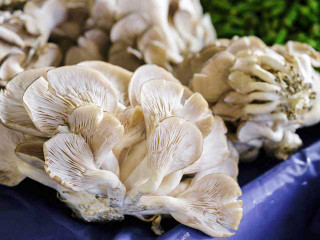Oyster Mushroom Benefits: Nutrition, Health, and Recipes
Posted by Troy Cosky, Founder FunGuy Grow Supply on 1st Jun 2023

Boosting Immune Health with Oyster Mushrooms
So, you might be wondering why adding oyster mushrooms to your diet can do wonders for your body. Well, these mushrooms are packed with health benefits that make them an excellent addition to any meal. One of the major benefits is their ability to boost immune health. Oyster mushrooms contain beta-glucans, a type of complex sugar molecule that helps activate the immune system and fight infections.
In addition to boosting immune health, eating oyster mushrooms have many other benefits that can help improve overall health and well-being. They're low in calories and high in dietary fiber, making them an ideal food for weight management and digestive health. Additionally, oyster mushrooms contain antioxidants such as ergothioneine and glutathione, which protect the body from oxidative stress and may reduce the risk of chronic diseases.
Exploring the Different Types of Oyster Mushrooms (Pleurotus ostreatus)
Did you know that exploring the different types of oyster mushrooms can add variety and nuance to your culinary repertoire? Oyster mushrooms aren't just delicious, but they also offer numerous health benefits. They contain beta-glucans that enhance immune function and reduce inflammation. Additionally, they're rich in antioxidants and provide vitamins B1, B2, B3, C, D, and K.

There are many types of oyster mushrooms available in the market. The most common one is the pearl oyster mushroom found in North America. Apart from this type, there is king oyster mushroom- the largest among all types found in Asia, North Africa, and the Middle East. Pink oyster mushroom has a bright pink color that fades when exposed to heat but offers a pungent flavor that can taste like bacon if cooked right. Phoenix oysters look and taste similar to pearl oysters but are slightly smaller than them. Golden oysters have a bright gold color with a delicate texture whereas blue ones have a bluish tint but taste exactly like pearl oysters.
Each type of mushroom has its unique taste profile and nutritional value. Incorporating these different types into your diet can help boost your immune system while adding variety to your meals.
In the next section, we'll delve deeper into the nutritional profile of these incredible fungi without missing any crucial details!
The Nutritional Powerhouse of Oyster Mushrooms
Get ready to be amazed by the nutritional powerhouse that's packed into these delicious edible fungi. Oyster mushrooms aren't just low in calories, fat, and triglycerides, but they're also high in protein, fiber, and essential vitamins and minerals.
Here's a breakdown of their impressive nutritional profile:

- Vitamins: Oyster mushrooms contain high levels of niacin, riboflavin, and pantothenic acid - all of which play a crucial role in energy metabolism. They're also rich in vitamin D2, which helps maintain strong bones and teeth.
- Minerals: These mushrooms are packed with essential minerals like phosphorus, potassium, copper, iron, manganese, zinc, and magnesium. Each mineral plays a vital role in maintaining healthy bodily functions such as building stronger bones or boosting immune function.
Additionally, the high levels of zinc found within oyster mushrooms can help to boost your immune system leading to better overall health.
- Fiber: Each serving of oyster mushrooms provides a good amount of fiber which aids digestion while contributing towards feelings of fullness making it easier to stick to your diet.
Incorporating oyster mushrooms into your diet can offer incredible benefits for your immune system. The combination of vitamins and minerals found within these fungi can help boost overall immunity leading to better health outcomes. Additionally, the fiber present will aid digestion allowing you to absorb more nutrients from other foods you consume.
Overall, this nutritional profile shows just how incredible oyster mushroom nutrition really is. They provide an array of nutrients that work together synergistically improving both digestive function as well as one's overall immunity. In our next section, we'll dive deeper into the specific health benefits associated with consuming oyster mushrooms on a regular basis!
Unleashing the Health Benefits of Oyster Mushrooms
You can experience a plethora of advantages by simply incorporating oyster mushrooms into your daily diet. These fungi are packed with nutrients that offer numerous health benefits, including reducing inflammation and regulating blood sugar. Oyster mushrooms contain specific proteins and antioxidants that boost your body's immune response, making them an excellent food for bolstering your immune health. They're also antiviral and antibacterial, providing an extra line of defense against infections.

In addition to their immune-boosting properties, oyster mushrooms have other health benefits as well. They can help lower cholesterol levels and prevent atherosclerosis due to their high beta-glucan content. If you're struggling with blood sugar control, these mushrooms may be of help since they've been shown to regulate blood sugar levels, which is beneficial for those with diabetes. Moreover, oyster mushrooms promote good bacteria in your gut while decreasing harmful bacteria and helping your gut produce more short-chain fatty acids that have widespread health benefits.
While more studies are needed to confirm their cancer-prevention and anti-cancer properties fully, preliminary research studies suggest that oyster mushrooms may help prevent certain types of cancer due to the presence of polysaccharopeptide compounds. Furthermore, these low-calorie fungi are excellent food for weight management since they're high in fiber content that promotes satiety while keeping calorie intake low.
Incorporating oyster mushrooms into your diet provides a host of health benefits beyond just nutrition. As you can see, the impressive nutritional profile of oyster mushrooms translates into significant health benefits for anyone who consumes them regularly. From boosting immune system function to promoting gut health and potentially preventing cancer, there's no shortage of reasons why you should add this superfood to your diet ASAP! If you want to take things a step further and grow your oyster mushrooms at home, keep reading our next section on how to do so effectively.
Growing Your Own Oyster Mushrooms at Home
Imagine having a mini mushroom farm in your own home, with fresh, earthy mushrooms growing in the comfort of your own space. Growing your oyster mushrooms isn't just easy and convenient, it also provides numerous health benefits.

Oyster mushrooms are packed with essential nutrients that contribute to overall wellness and immune health. They're low in calories while high in protein, fiber, and antioxidants. Oyster mushroom nutrition is impressive; they contain essential vitamins such as B-complex vitamins, and vitamin D, and minerals like potassium and selenium. These nutrients help maintain healthy bones, support brain function, and boost immunity.
By growing your own oyster mushrooms at home, you can ensure that they're organic without any harmful chemicals or additives. The health benefits of oyster mushrooms are plenty; they have been shown to reduce inflammation throughout the body, which helps protect against cancer and other chronic diseases. Oyster mushroom extracts have been found to possess antiviral properties that could potentially be used for treating viral infections like influenza and HIV. Additionally, these fungi contain beta-glucans which stimulate the immune system by activating white blood cells called macrophages.
Growing your oyster mushrooms is simple with mushroom growing kits available online or at local gardening stores. All you need is a small space with good ventilation, humidity control (around 85% - 90%), sterile containers filled with substrate (usually straw or sawdust), a spawn ( mushroom spores), and a water spray bottle for misting occasionally during the incubation period after inoculation before harvesting time comes around!
By growing your oyster mushrooms at home, you not only get to enjoy their incredible taste but also reap their many health benefits. Incorporating them into your diet can be done in various ways, such as sautéing them with garlic or adding them to soups and salads. In the next section about the specifics of incorporation into the diet, we'll explore more ways to enjoy these nutritious fungi.
Specifics of Incorporation in Diet
Now that you've grown your own oyster mushrooms, let's explore delicious and creative ways to incorporate them into your meals. Oyster mushrooms aren't just tasty, but they also have incredible health benefits for your immune system.

These fungi are rich in antioxidants, which help protect your cells from damage caused by free radicals. Additionally, oyster mushrooms contain beta-glucans that can boost the production of white blood cells in your body.
When it comes to oyster mushroom nutrition facts, these fungi are low in calories and high in nutrients. They're a good source of protein, containing all essential amino acids needed for muscle growth and repair. Oyster mushrooms are also packed with vitamins B and D, as well as minerals such as iron and selenium.
Incorporating these nutritious fungi into your diet is a great way to improve overall health. One easy way to enjoy oyster mushrooms is by adding them to soups or stews in place of meat or other vegetables. You can also sauté them with garlic and olive oil for a flavorful side dish or top them on pizza for added texture and taste.
For a protein-rich breakfast option, try adding chopped oyster mushrooms to scrambled eggs or an omelet. Incorporating oyster mushroom benefits into your diet is simple and rewarding. By consuming these nutrient-dense fungi regularly, you'll be supporting your immune system while enjoying their delicious taste.
In the next section about growing your oyster mushrooms, we'll discuss tips on how to ensure successful cultivation at home without breaking the bank.
Creative Ways to Incorporate Oyster Mushrooms into Your Diet
Get ready to experience the satisfaction of growing your own delicious and nutrient-packed fungi with these simple tips for cultivating oyster mushrooms at home. Not only are oyster mushrooms tasty, but they also offer a variety of health benefits that can contribute to overall immune health. By growing your own oyster mushrooms, you can have a fresh supply on hand whenever you need them.

To begin growing your own oyster mushrooms, start by obtaining a mushroom grow kit or purchasing spores online. These kits typically come with everything you need to get started, including substrate bags and inoculated spawn. Once you have your kit, simply follow the growing guide provided for optimal growth.
When it comes to choosing a location for your mushroom grow kit, keep in mind that oyster mushrooms thrive in cooler temperatures between 55-65 degrees Fahrenheit. A basement or cool closet may be an ideal spot for cultivating these delicate fungi. Additionally, make sure to keep the area well-ventilated and avoid direct sunlight.
One key benefit of growing your oyster mushrooms is that they're easy to maintain and require minimal space compared to other crops. They also provide a high yield relative to their size, meaning you can enjoy multiple harvests from just one kit. Incorporating homegrown oyster mushrooms into your diet is an excellent way to reap their many health benefits while enjoying their delicious flavor.
As you embark on this exciting journey of growing your oyster mushrooms at home, it's important to consider certain precautions and proper handling techniques such as washing hands before handling the mushroom grow kit or wearing gloves during the harvesting process. By following proper guidelines and taking care when working with these nutritious fungi, you can enjoy all the incredible benefits that come with incorporating fresh-grown oyster mushrooms into your lifestyle!
Precautions and Considerations for Oyster Mushroom Consumption
Before incorporating homegrown oyster mushrooms into your diet, it's important to consider certain precautions and handle them with care. While they offer numerous health benefits, including immune system support and anti-inflammatory properties, some individuals may have allergic reactions to mushrooms. It's essential to consult with your healthcare provider if you have a specific health condition or are unsure about incorporating oyster mushrooms into your diet.

Oyster mushroom benefits for immune health are remarkable due to their high levels of antioxidants, beta-glucans, and polysaccharides. These compounds help boost the immune system by neutralizing harmful free radicals in the body while also stimulating immune cell production. The king oyster mushroom benefits are even more impressive as they contain ergothioneine which can prevent oxidative damage and increase antioxidant activity in the body.
However, before consuming oyster mushrooms, ensure that they're fresh and properly cooked. Improper handling can lead to bacterial contamination that can cause food poisoning or other side effects. Additionally, some people may experience gastrointestinal issues such as bloating or diarrhea when consuming large quantities of mushroom products.
In conclusion, while there are many health benefits of oyster mushrooms like supporting the immune system and reducing inflammation, it's essential to take necessary precautions when consuming them. If you're growing your mushrooms at home, make sure you follow proper hygiene practices during cultivation and storage. Also, always cook them thoroughly before consumption to avoid any potential risks associated with raw consumption.
By following these guidelines, you can enjoy the incredible health benefits of oyster mushrooms without any side effects or adverse reactions.
Conclusion: Harnessing the Benefits of Oyster Mushrooms
Well done! You've learned about the incredible benefits of oyster mushrooms for your immune health. By incorporating this delicious and nutritious fungus into your diet, you can boost your immune system, reduce inflammation, and improve heart health.
Remember to choose from the various types of oyster mushrooms available, such as the pearl or blue oyster mushroom, and grow them at home using a substrate such as straw or sawdust.
When cooking with oyster mushrooms, try sautéing them with garlic and olive oil or adding them to soups and stir-fries.
Although generally safe for consumption, it's important to be aware of any possible allergies or interactions with medications before including oyster mushrooms in your diet.
With all these amazing benefits, why not give oyster mushrooms a try today?
Frequently Asked Questions about Oyster Mushrooms

Can oyster mushrooms be eaten raw?
Yes, oyster mushrooms can be eaten raw, but it's important to note that they have a tough texture and a slightly bitter taste. If you prefer to eat them raw, it's recommended to slice them thinly and marinate them for a few minutes to soften the texture and enhance the flavor.
However, cooking oyster mushrooms is generally preferred as it not only improves their taste but also increases their nutritional value by helping to break down their chitin cell walls, which can be difficult for our bodies to digest.
So whether you choose to eat them raw or cooked, incorporating oyster mushrooms into your diet is an excellent way to boost your immune health with their many incredible benefits.
Are there any side effects of consuming oyster mushrooms?
Consuming oyster mushrooms is generally considered safe and there are no known side effects of consuming them. However, it's important to ensure that you obtain them from a reputable source and cook them properly before consumption. Raw or undercooked mushrooms can contain harmful toxins that can cause digestive issues such as nausea, vomiting, and diarrhea.
Additionally, individuals with mushroom allergies should avoid consuming oyster mushrooms. Overall, as long as you take the necessary precautions, adding oyster mushrooms to your diet can provide numerous health benefits without any adverse effects.
How do oyster mushrooms compare to other types of mushrooms in terms of nutritional value?
Oyster mushrooms are a highly nutritious type of mushroom that offer many health benefits. Compared to other types of mushrooms, oyster mushrooms are particularly high in protein and fiber, making them an excellent addition to any diet. They also contain important vitamins and minerals such as vitamin B, potassium, and copper.
Additionally, oyster mushrooms have been shown to boost the immune system and reduce inflammation in the body. So, if you're looking for a tasty way to improve your overall health, consider incorporating some delicious oyster mushrooms into your meals!
Can oyster mushrooms be used medicinally?
Did you know that oyster mushrooms can be used medicinally? These versatile fungi have multiple health benefits. They boost immune health because they contain beta-glucans, which stimulate the immune system and help fight off infections and diseases. Oyster mushrooms also contain antioxidants, which protect cells from damage caused by free radicals and reduce inflammation in the body. Additionally, they have been shown to lower cholesterol levels and improve heart health.
With so many incredible benefits, it's no wonder why oyster mushrooms are becoming a popular addition to many people's diets as a way to promote overall wellness.
Are there any environmental concerns associated with growing oyster mushrooms at home?
Are you considering growing oyster mushrooms at home? While there are many benefits to cultivating these delicious fungi, it's important to be aware of potential environmental concerns.
Oyster mushrooms require specific growing conditions and substrates, which can create waste and require resources such as water and energy. Additionally, improper disposal of the spent substrate can lead to contamination of soil and surrounding ecosystems.
However, with proper research and management techniques, it's possible to minimize the environmental impact of home mushroom cultivation.
Boost Your Immune Health with FunGuy Grow Supply! Start growing nutrient-packed oyster mushrooms at home. Shop now for top-quality mushroom growing kits, grow bags, and grain spawn.
References
- Jayachandran, M., Xiao, J., & Xu, B. (2017). A Critical Review on Health Promoting Benefits of Edible Mushrooms through Gut Microbiota. International Journal of Molecular Sciences, 18(9). Retrieved from DOI: 10.3390/ijms18091934
- Wasser, S. P. (2002). Medicinal mushrooms as a source of antitumor and immunomodulating polysaccharides. Applied Microbiology and Biotechnology, 60(3), 258–274. Retrieved from DOI: 10.1007/s00253-002-1076-7
- Chang, S. T., & Wasser, S. P. (2012). The role of culinary-medicinal mushrooms on human welfare with a pyramid model for human health. International Journal of Medicinal Mushrooms, 14(2), 95–134. Retrieved from DOI: 10.1615/intjmedmushr.v14.i2.10

